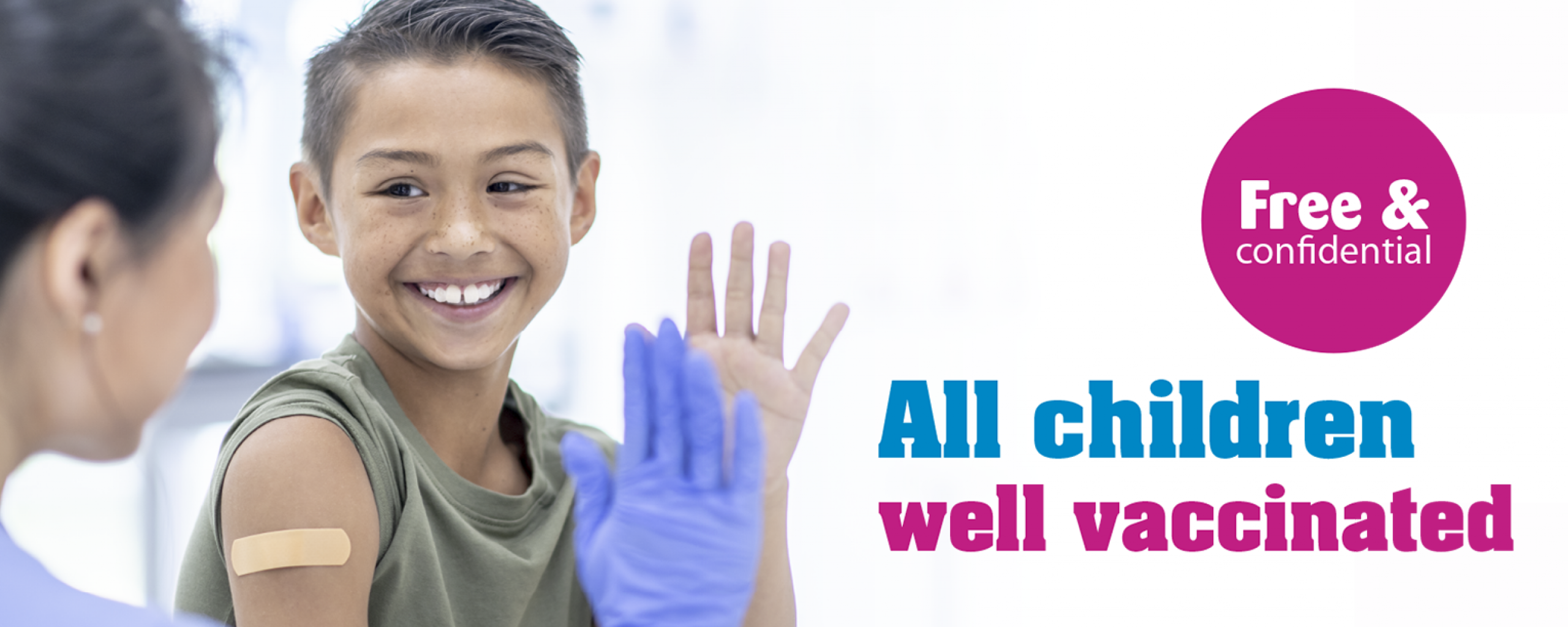Immunization against viral and bacterial diseases is very essential for the public health of a country. Vaccination against infectious diseases has been proven to improve the quality of life, decrease diseases and mortality in humans. Reason why all children age 0 to 12 years old are given access to the vaccination program in Aruba no matter the legal status of their parents.
All children well vaccinated
Why?
To protect them and by so doing guarantee the wellbeing
and health of all children living in Aruba.
For Whom?
All children age 0 to 12 years old from foreign descent,
who are living illegally in Aruba.
This service is given for free and your information will be kept confidential.
How?
By giving each child the necessary vaccines to complete his or her vaccinations against: Measles, Mumps, Rubella (German Measles), Tetanus, Poliomyelitis, Diphtheria, Pertussis (Whooping cough), Pneumococcal diseases, Human Papiloma Virus and Hepatitis B.
The vaccination schedule in Aruba is as follows:

HepB: Hepatitis B vaccine
DKTP-Hib: vaccine against Diphtheria, Pertussis (Whooping cough), Tetanus, Poliomyelitis, and Haemophilus Influenza Type B
Pneu: Pneumococcal vaccine
MMR: vaccine against Measles, Mumps, Rubella (German Measles)
DKTP: vaccine against Diphtheria, Pertussis (Whooping cough), Tetanus, Poliomyelitis
HPV: vaccine against Human Papiloma Virus *for girls only
What to do?
Contact the White Yellow Cross (Wit Gele Kruis) closest to you (see table below) or the Youth Health Care Service (JGZ) of the Department of Public Health for more information and to make an appointment.
| Telephone | |||
|---|---|---|---|
| WGK Noord | 281-4514 | 594-8439 | [email protected] |
| WGK Dakota | 281-4515 | 594-8476 | [email protected] |
| WGK Santa Cruz | 281-4517 | 594-8437 | [email protected] |
| WGK San Nicolaas | 281-4523 | 594-8443 | [email protected] |
| Youth Health Care Service (JGD) | 522-4294 | [email protected] |
We want to remind you that this service is for free, and all information will be kept personal and confidential.
Frequently Asked Questions:
Vaccines are products that are usually given in childhood to protect against serious, often deadly diseases. By stimulating your body’s natural defenses, they prepare your body to fight the disease faster and more effectively.
Vaccines help your immune system fight infections more efficiently by sparking your immune response to specific diseases. Then, if the virus or bacteria ever invades your body in the future, your immune system will already know how to fight it.
Vaccines are safe. Your child is far more likely to be hurt by a vaccine-preventable disease than by a vaccine. All vaccines go through rigorous safety testing, including clinical trials, before they are approved for the public. Countries will only register and distribute vaccines that meet rigorous quality and safety standards.
Vaccines save lives. Measles vaccines alone are estimated to have prevented over 23 million deaths between 2000 and 2018.
Vaccines will help protect your child against diseases that can cause serious harm or death, especially in people with developing immune systems like infants.
It’s important to vaccinate your child. If not, highly contagious diseases such as measles, diphtheria, and polio, which were once wiped out in many countries, will come back.
Yes. Many parents worry that multiple vaccines will overload their child’s immune system. But children are exposed to hundreds of germs every day. In fact, a common cold or sore throat will put a greater burden on your child’s immune system than vaccines.
Yes. Although the diseases may be eliminated in Aruba or region, our increasingly interconnected world means that these diseases could spread from areas where they are still present.
If enough people in your community are immunized against a certain disease, you can reach something called herd immunity. When this happens, diseases can’t spread easily from person to person because most people are immune. This provides a layer of protection against the disease even for those who are not vaccinated, such as infants.
Herd immunity also prevents outbreaks by making it difficult for the disease to spread. The disease will become more and more rare, sometimes even disappearing entirely from the community.
Vaccines are safe and serious side effects are rare. Almost all sickness or discomfort after vaccination is minor and temporary, such as a soreness at the injection site or mild fever. These can often be controlled by taking over-the-counter pain medication as advised by a doctor or applying a cold cloth to the injection site. If parents are still concerned, they should contact their house doctor or the White Yellow Cross.
Extensive studies and research show that there is no evidence of a link between vaccines and autism.
Vaccines protect your child against serious illnesses like Polio, which can cause paralysis; Measles, which can cause brain swelling and blindness; and Tetanus, which can cause painful muscle contractions and difficulty eating and breathing, especially in newborns. For a list of the most common vaccines and the diseases they prevent, see the list of the most common vaccines and the diseases they prevent.



